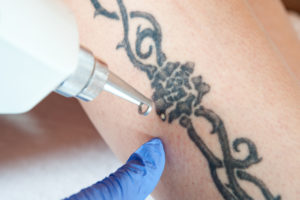
Tattoos can be great additions to your skin. For many people, they tell a story. For others, they’re an expression of art and beauty. However, what happens if you grow out of love with your ink?
Considering that a full 59% of adult women read beauty product labels to understand what they are using, for some, tattoos can be quite different as every artist differs in their application and technique. Just until recently there been a surge in tattoo removal methods for those who have decided they hate their ink, and there have been plenty of new techniques formed that can help you to safely care for your skin without causing any negative side effects.
To help you understand exactly what happens in the tattoo removal process, we’ve outlined some frequently asked questions on removing your tattoos for good.
What kind of tattoo removal methods are there?
The two most popular techniques are laser tattoo removal and tattoo removal cream. The first includes a high-powered laser that breaks up the ink in your skin fully. On the other hand, using certain creams focuses on fading tattoos, but doesn’t remove them completely.
How long will it take to reduce the tattoo completely?
There are two factors to take into consideration. First, the time frame relies on your body’s ability to break up ink from the skin and how fast it heals. And secondly, it depends on the size of the piece. At a minimum, you will have to wait at least six weeks between laser sessions to allow your skin to heal and for your immune system to flush away the ink.
Does it hurt?
Even though each patient’s pain tolerance differs, there will be some level of pain to expect when going through the tattoo removal process. Fortunately, you will be offered numbing cream as a way to make the procedure more comfortable.
Will it cause scarring?
Generally speaking, no. Unless the tattoo already has a scar in it, it is very uncommon for the laser treatment to leave a scar.
What are the side effects?
The most common side effects include redness, tenderness, swelling, scabs, and blistering. All these will be temporary, and your technician will be able to provide skin care products to help speed up the healing process.
It is important to understand everything that goes into tattoo removal before you agree to treatment. If you have any questions about what this process entails, do not hesitate to contact our professionals today.
